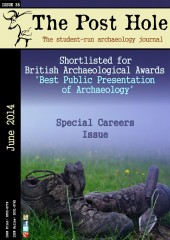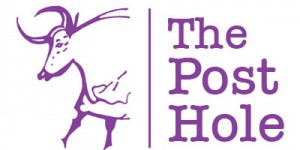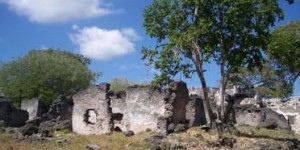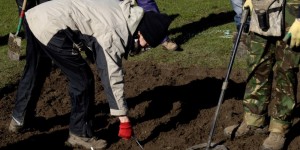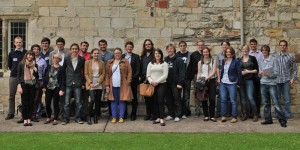David Roberts studied a BA in Archaeology and an MA in Landscape Archaeology at York University. Having dug in both France and the UK, David Roberts main interests lie within landscape survey and excavation.
What area of archaeology do you work in?
My day job for English Heritage involves managing archaeological projects. Working within the National Heritage Protection Plan framework, which sets our strategic priorities, I design, undertake and disseminate the results of excavations. This involves managing complex project logistics and writing project designs to enable us to undertake work to standards that (hopefully) set an example to the rest of the sector.
Many of these interventions coincide with my own research interests, which focus on understanding human-landscape interactions in later Prehistory and the Roman period in Britain and France. I enjoy managing projects because it gives me a chance to work with lots of really interesting experts from across the sector and learn from them, and to make a meaningful contribution to research and heritage protection.
What sparked your interest in archaeology, and why did you choose to do a degree in this area?
I got into archaeology through the back door – I had applied for history at university, but didn’t get offers from my top choices, so had a look at the courses available through clearing. York was somewhere I’d always liked visiting, and with my strong interest in the past I was really interested when I saw places on the BA Archaeology course were available. Looking back, this was a really lucky break – my love of the outdoors and working with big teams is a much more natural fit to archaeological rather than historical study, and I feel very lucky to have fallen into such an amazing discipline.
What was your PhD project about?
My PhD (still in the process of being finished!) is on human-landscape interactions in south-west Wiltshire and Provence in the Roman period. It essentially involves taking quite a new theoretical approach to studying Roman society, focusing on everyday activities in the landscape, and trying to understand what the evidence for these can tell us about how people understood the world around them, and how society changed over time.
Why did you choose to specialise in this area?
I’ve always found that I’m good at thinking about the big picture, and synthesising information, and not as good at really detailed specialist analysis. The idea of telling the really big stories of the past strongly appeals to me, and I think that much current archaeology can get over-focused on really fine-grained analysis, thinking less about the wider context. Obviously, we need to do both, so I like contributing to teams by bringing a wider perspective, and working with expert colleagues who can provide detailed scientific understanding.
Could you explain your work at Teffont, and how the project began?
Again, luck! I was staying with friends following a mountaineering expedition in Snowdonia, and got talking to a friend’s parent who owned land in Wiltshire, at Teffont. They invited me down to have a look at the area, because they’d always had an interest in the Roman period. That summer, a group of my undergrad friends and I did some initial recon, and found strong indications of Roman settlement. Since then, our team has developed the project into a major field school entirely under our own steam, with logistical support from the department and financed by low digging fees for students and small grants from institutions such as the Royal Archaeological Institute, Roman Research Trust and the Association for Roman Archaeology. We’ve uncovered a really well preserved and complex landscape of settlement and ritual, and are beginning to be able to tell a really exciting story about Teffont’s Roman past. Perhaps the best part of the project for me is the community we’ve built up over the years, with the core team and local contacts keeping in touch and becoming really close friends, returning every year for more research and fun.
What other excavations/projects are you involved in and currently working on?
So many! I’ve two major projects for English Heritage, involving four separate excavations this summer. I’m working on a brilliant site at Whitby for EH this April, there’s a Teffont Easter recon week, Teffont’s fortnight long summer season, a hillfort which I’m coordinating landscape survey for, the Common Ground project, where I’ve directed excavations for a landscape project run by Al Oswald, Helen Goodchild and myself, and the past landscapes of south-west Wiltshire project, for which I’ve just received a large grant from the Society of Antiquaries. I’m also advising on a wide range of other research projects, and above all, trying to finish my PhD! I’m still trying to finish articles with colleagues on spatial theory, animal agency, PAS data, environmental consilience, Teffont’s field report for 2010-2011 and several other papers of my own. I believe in keeping busy!
What is your experience of finding a job within the archaeology sector?
I got very, very lucky – a good job came up when I’d run out of PhD funding, and in my specialist area of Roman Wiltshire. This almost never happens. I applied, making sure to get friends with more experience than me to comment on my application, and really enjoyed the interview. A couple of weeks later it turned out I’d got the job, much to my surprise!
Have you found that having a PhD is useful or necessary in your current job?
Yes, I’ve found that it’s been both useful and necessary to have done PhD research … but I haven’t actually got a PhD yet, as I haven’t finished my thesis!
What do you hope to achieve in the future?
Finish my PhD! Hopefully to continue working with interesting people on worthwhile projects, and to push on in my career. Above all, to make sure that what I’m doing stays fun.
Any tips for those interested in archaeology reading this interview wanting to work in the same kind of role?
Make sure you take responsibility, and make sure to take whatever opportunities you get to advance your career in the direction you want. Think big, both in terms of big picture archaeology, and what you’d like to do with your own projects. Above all, talk to people! You won’t get anywhere in archaeology without your friends, and without making contacts. Whenever you get the chance go to conferences, pub nights, seminars and events, start chatting to people. Almost everyone in archaeology is genuinely a nice person, and most are happy to chat, and help you out. Finally, don’t get down if you don’t succeed in getting a job for a while after your degree – archaeology is something lots of people want to do, and you’ve got to stick at it to get through. Good luck!
For more information on David Roberts, and relevant work, please follow:
http://www.york.ac.uk/archaeology/research/research-students/david-rober...
https://york.academia.edu/DavidRoberts
For more information on the Teffont project, follow: http://www.teffont.org.uk/about/


